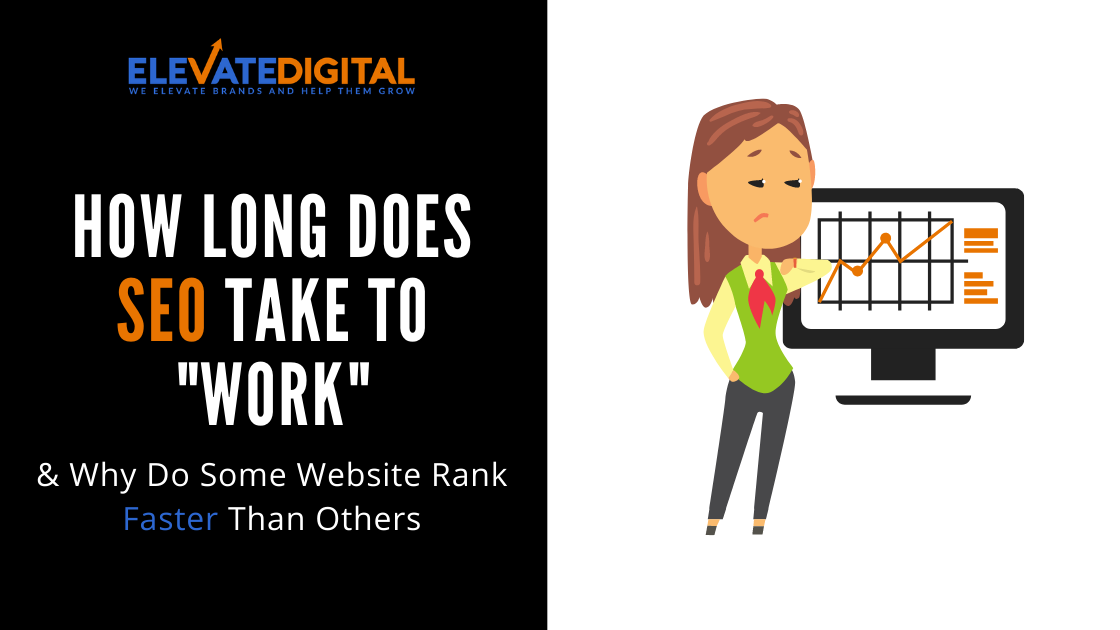When it comes to Search Engine Optimization (SEO), you could think that once a site is “optimized,” the traffic should immediately follow. However, things aren’t quite so black-and-white. Once SEO techniques are implemented, it might be only a few months to see substantial results, or it might take twice as long. The answer to this question, however unsatisfactory, is it depends.
There are a variety of factors that influence the results of SEO and affect how long it takes to “work.”
While not being some set of John C. Maxwell-type “laws” of marketing, these factors primarily relate to how a search engine works and ranks website content.
How a search engine works
The mechanics of the search engine can be understood through three functions:
- Crawling: When you type a query into a search bar, the search engine must, as the name implies, go searching the internet. In this sense, it crawls through the vast amounts of URLs and looks at their information.
- Indexing: Suppose you go to a clothes store, ask if they have any red shirts, and are instead directed to a massive pile of clothes with the ever-so-helpful, “it should be in there.” Obviously, an organized collection of clothes would make it far easier to find the desired shirt. This is where indexing comes in handy. All information found suitable in the crawling process is indexed and organized in a database, making it easier to sort through the relevant links in the next process.
- Ranking: This crucial aspect of the search engine process structures how the information is presented to users. The search engine algorithm determines which links in the index are most relevant to the query and presents them in that order. Now, what the algorithm uses to determine what is “relevant” changes constantly and is sometimes mysterious. However, there are a few, well understood factors, such as how many links are pointing to the site. This factor could mean that the site is well-frequented and not obscure, and is a reliable or authoritative source.
Factors affecting SEO
Search engine optimization tries to use these functions of the search engine to your advantage. Well it is evident that you can’t control the search engine itself and make your listing appear at the top all the time, you can try to make your website and content more “relevant.”
- Current Search Engine Rankings: Since sites can be indexed and ranked based on the quality of links pointing to them, a site with either poor quality links or very few will not rank very well. It is as if the site is only accessible from a gravel, country road as opposed to sitting on main street. If this is the case, it will take time to build up the site’s rankings through creating new content or social media and advertising campaigns.
- Domain Authority: This simply refers to a metric that assesses the likelihood that your site will be displayed in the list of search engine results. This score looks at all the links pointing to your domain and can give a good indication of your domain’s ranking.
- Competitiveness of Industry: If your industry is highly competitive, this means that there are a lot of similar pages out there. If this is the case, once someone searches for your category of product or service, the search engine has to assess all the other competitors as well. Your site then has to “fight” to be at the top of the list of search engine results. The competitiveness of the industry could make it harder for recently implemented SEO techniques to have their immediate effect.
- Domain Age: While this is something that cannot be helped, it can affect how well a site ranks compared to other sites. The fact is that an older site can rank higher than younger sites simply because it has been around longer. With this in mind, investing in SEO techniques can be seen as more of a secure, long-term strategy that will become more valuable as your site grows older.
- Changing Environments: Even though this sounds vague and more like a truism — “the only constant is change” — understanding the changing nature of online environments is crucial. Even though you may have optimized your site via blog posts and other customized content, trends in how people access and spend time on the internet could affect the results of your optimization. For example, video content is expected to represent 80% of internet traffic and is expected to keep growing. Additionally, people are accessing the internet through mobile devices, requiring more mobile-friendly sites.
Even though the time before results come pouring in can vary, this makes it even more crucial to have a well-tailored SEO strategy for your website that will always remain up-to-date on the recent trends.
There are also a number of SEO quick-wins you can implement to help boost your rankings and catch any low-hanging fruit.
Be sure to subscribe for more content like this!
Want More Organic Website Visitors?
Book your FREE website and marketing review today and we’ll record you a 15-minute personalised video showing you how to start improving your SEO and generating more organic traffic from the search engines.
- Highly-Effective DTC Marketing Strategies & Examples - February 28, 2024
- How To Set Paid Media Marketing Budget - October 16, 2023
- The Ultimate Guide To A/B Testing - September 23, 2023




